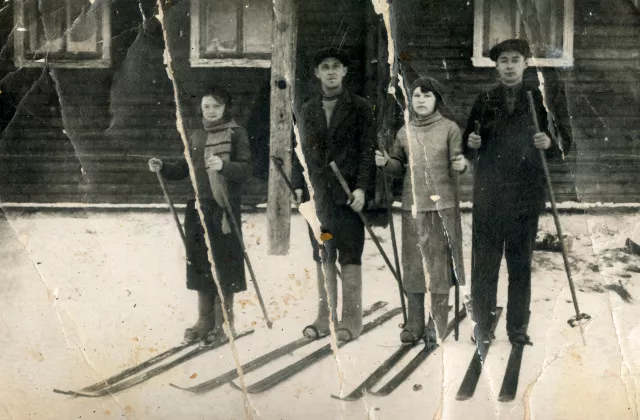This photo was taken in front of the school of Pervomayskoye village. Standing second to the left is my friend, Maxim Mikhailovich Rosenburg. My other companions' names I don't remember.
In summer 1934, after finishing the OBLONO courses, I was assigned to work as a teacher of labor and drawing in Chagodoschensky district of Leningrad region. Now Chagodoscha is part of Novgorod region, but at that time Novgorod, Pskov, Petrozavodsk and Murmansk were part of the big Leningrad region. I was accepted as a teacher to a high school in the village of Pervomayskoye. It was a beautiful location with a lot of forests. Pervomayskoye was a traditional center of glass-production. There were several small glass-works around.
I was accommodated in the former manor-house, a wooden house with a stove. I lived there all alone. In winter it was sometimes terrifying, when the wolves howled. I taught village children labor according to CLI method, as I had been taught at the FWS. I showed them elements of the working movement for the purpose of developing automatism and labor skills. In any case there were no real tools at school, except for a carver's mallet, wooden hammer, and an axe, which they knew how to use better than I did. I couldn't draw, so I contented myself with talks about how to draw. There were more experienced teachers at school, mostly middle-aged women, who forgave me all my mistakes because of my young age. I was 19. There was a wonderful teacher of physics, exiled from Leningrad for his inappropriate social origin; and an experienced teacher of chemistry. They got married later.
The most difficult trial was conversations related to foreign and internal policy with the collective farmers, kolkhozniks, from neighboring villages on the instructions of the local village Soviet [local authority]. It was a very hard time. I didn't have any understanding of politics and didn't know what to say. However, everything turned out fine. Apparently my listeners knew even less than I did.
The following year polytechnic labor was abolished at schools. There weren't enough resources to support the good idea of polytechnic education. The country wasn't able to furnish schools with necessary equipment and tools. I had to return back home to my mother.

















